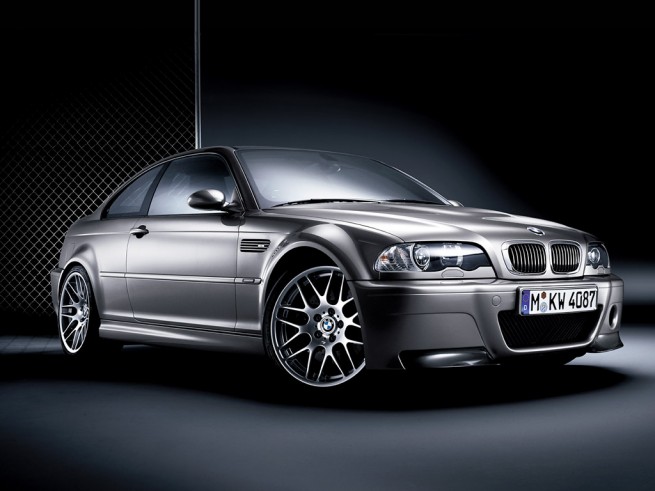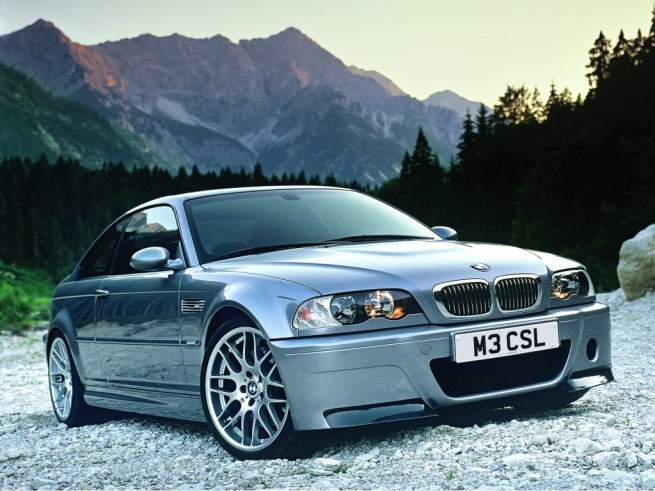Could the E46 M3 CSL be the best car to come out of BMW M division? And can BMW build another one just as good?
CSL stands for “Coupe Sport Lightweight”, a moniker first given to the legendary race winning BMW 3.0 CSL. First appearing in 1972, the 3.0CSL homologation special model was very successful in racing, especially in the European Touring Car Championship and the Deutsche Rennsport Meisterschaft, thus securing BMW’s position amongst motorsport giants.
The first BMW M3 CSL appeared in 2003 and wowed enthusiasts all around the world with its use of racing technologies applied to a street car. Among these technologies was a modified version of the usual 3,246-cc S54 inline-six that lacks a conventional mass airflow meter. Instead, intake air is calculated directly by the DME, making for a much quicker engine response. Further changes include modified camshafts and exhaust valves, plus a lightweight exhaust system constructed of thinner steel. The CSL-spec engine is rated at 360 hp at 7,900 rpm and 273 lb-ft of torque at 4,300 rpm.
The E46 M3 CSL is most notably distinguished from the standard E46 M3 by its various lightweight components. The signature differentiation is the Carbon Fiber reinforced roof panel (GFP) which weighs 13 pounds less than the conventional roof. The front bumper support is also constructed of GFP, as well as the unique “Single Air inlet” front bumper. At the rear, the lower rear valance is made of GFP, while the reshaped trunk lid is made of SMC (sheet molding compound). Fiberglass-reinforced plastic is used for the rear bumper supports and this material is also “sandwiched” with thermoplastics and foam to create the trunk floor and rear bulkhead. As a final weight-saving measure, the rear window glass is extra thin. BMW claimed that the M3 CSL weighed 3,054 pounds, or roughly 10 percent less than the normal model.
The M3 CSL is equipped exclusively with the SMG II transmission featuring a special launch control mode that automatically shifts at the optimum point for maximum acceleration. This is mated to the standard E46 M3 final drive and M locking differential. Also, the DSC system of the M3 CSL can be switched to an exclusive M Track Mode via the steering wheel-mounted button. This raises the threshold at which the system intervenes to allow for some degree of sideways fun.
The suspension of the M3 CSL is based on that of the standard E46 M3. However, it does incorporate a number of changes: shorter stiffer springs and shocks with different rates (for both rebound and compression), plus larger anti-roll bars in the front (30.8 mm) and rear (22.5 mm). In addition, the normal aluminum front control arms (shared with the standard E46 M3) are joined by aluminum rear suspension links with stiffer ball bushings. Rounding out the chassis upgrades is a quicker ratio steering rack (overall ratio: 14.5:1) and larger 13.7-inch cross-drilled front brake rotors. Finally, the M3 CSL rides on lightweight cross-spoke alloy wheels measuring 8.5×19-inches in front (0.5 inches wider than the normal M3) and 9.5×19-inches in the rear. These are shod with special Michelin Pilot Sport Cup tires sized 235/35ZR19 (front) and 265/30ZR19 (rear).
Conventional tires mounted to the 19-inch forged M Double Spoke II wheels from the standard E46 M3 were also offered as a no-cost alternative.
Serving the lightweight purpose of the M3 CSL, the interior could be specified without climate control or a radio. However, both were made available at no additional cost.
A total of 1,358 CSLs were produced for European track junkies between June and December of 2003, in both left-hand drive (823 built) and right-hand drive (535 built).
With more and more BMW vehicles “gaining weight” as new generations come to market, could BMW build another street car like the iconic M3 CSL? Well, at a smaller and exclusive scale, they recently have built an unique M3. The new E92 M3 GTS is a spiritual successor to the E46 M3 CSL.
Although the M3 GTS is slightly quicker in a straight line than the E46 CSL, the lap times around the Nurburgring are surprisingly close. According to FastLaps.com, the 450 hp GTS is faster than the 360 hp CSL by a mere 2 seconds. 7:50 vs 7:48.
What the E46 M3 CSL lacks in horsepower over the M3 GTS, it makes up for in sheer driving feel and balance. Some consider the E46 chassis to have been the best BMW has ever built, making the CSL one of the best performance BMW ever.
Let’s round up some other opinions from BMWBLOG team members:
Andrew Murphy – Editor
It’s BMW at its best.
The M3 CSL is just an honest, straightforward performance BMW. The CSL managed to combine many of the most identifiable traits of a BMW of the period into a single package. Naturally aspirated 3.2L inline-6, light weight materials, and hardcore near-slick tires wrapped around 19 inch wheels. The M3 CSL managed to deliver more performance than the standard E46 M3 at a still-reasonable price point.
The result of Garching’s hard work? A car that is worth much more than the sum of its parts. The CSL was the remind of BMW’s original roots – a sports sedan that car usher you around in style or a competent, wonderfully balanced track monster.
Misha Nikolich - Contributor
To me, the E46 CSL is the epitome of BMW M engineering and driving dynamics. It combines the roots of M’s early sports coupes like the E30 M3 with modern technology and lightweight materials. Result – a precise, no frills, pure motorsports inspired machine that touched the soul of those gearheads who crave pure driving nirvana.





https://smolckbmw.blogspot.com/2012/11/the-cost-of-thanksgiving-turkey-blood.html?sc=1734939915580#c3544841374119519817i
ReplyDelete